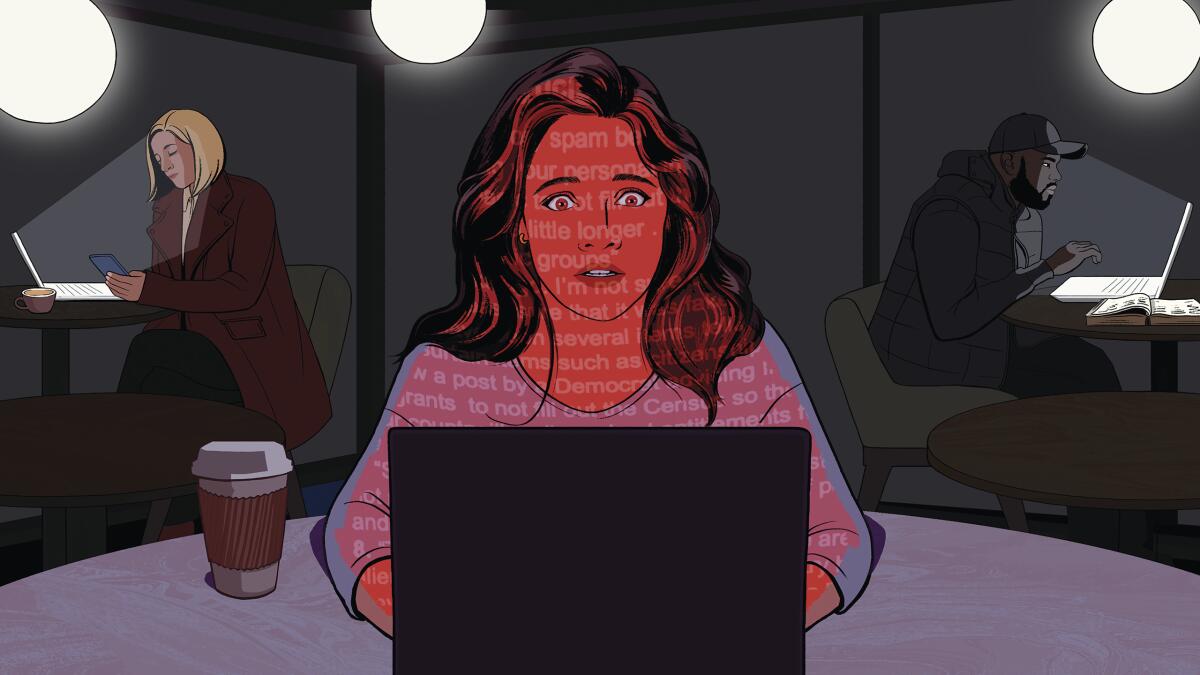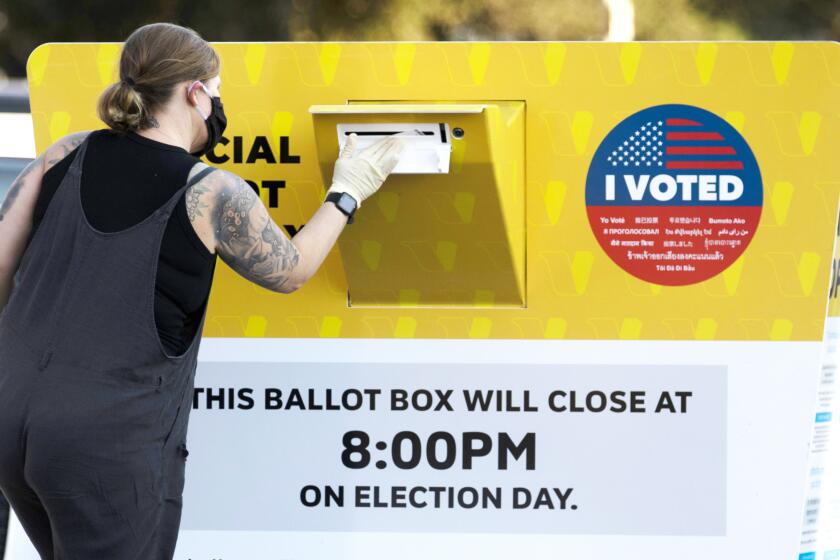Poll: California voters agree political disinformation is a big problem. But how to fix it?

A majority of California voters across lines of party, race and age find political disinformation a serious problem — and there is little agreement about whom to trust, a new poll from the UC Berkeley Institute of Governmental Studies found.
Just over half of voters surveyed for the poll said that not knowing whether information is accurate and truthful is a “major problem,” while a third called it a “minor problem.”
Alongside the pervasiveness of misinformation is a great distrust of information of any kind, good or bad. Fifty-eight percent of voters generally have a low level of trust in political and election information they get from the mainstream media, the poll found.
But even more, 79%, reported low levels of trust in election news they see on social media such as Facebook, Twitter (now known as X) and TikTok.
Trust in mainstream news is sharply divided by political party — 57% of California Democrats, but only 15% of Republicans, said they have a fair amount or a great deal of trust in mainstream media.
“If we’re not in the same reality as each other — we’re not operating under the same basic principles of fact and truth — we can’t operate as a democracy,” said Kim Nalder, Sacramento State political science professor and political misinformation expert.
“How do you evaluate candidates or claims or policies if you don’t know what’s true and what’s false?” Nalder asked. “It undermines the very idea that we’re voting based on our own values and beliefs and experiences.”
California has made a major effort to make voting easier. Those who don’t vote regularly say they lack information or aren’t interested in the candidates.
Most California voters — 67% — rely on local television and radio for political news, the poll found, followed by 54% who cited reference materials and online searches and 44% who look to newspapers or magazines, online or in print.
Media usage varies predictably by age. Just over half of voters 65 and older said they use newspapers and magazines to get information, compared with just under a third of voters 18 through 29 years old.
Young voters were somewhat more likely to report at least a fair amount of trust in election news found on social media — 25% of those 18 through 29, compared with 10% of those 65 and older.
“It’s not surprising that people think that there’s misinformation and disinformation on social media, because there is,” Nalder said. “They’re not wrong.”
Misinformation can spread rapidly on social media, leading to violence such as the attack on the husband of former House Speaker Nancy Pelosi (D-San Francisco). It can also have an impact on local elections. In 2016, Russian operatives used fake social media accounts, especially on Facebook and Instagram, to sow confusion during the presidential election and elevate their preferred candidate, Donald Trump.
Since the 2020 election, the Republican former president has, in turn, used social media to spread disinformation about the results of that vote, falsely claiming he had beaten his Democratic rival, Joe Biden.
The new poll also points to how campaigns reinforce inequities in the electorate.
Previous polls by the Berkeley institute have indicated that California voters, especially those who vote routinely, are whiter and older than the state’s population. Campaigns tend to target those regular voters rather than focusing on increasing turnout among others, the new poll found.
Almost two-thirds of regular voters — people who had voted in at least five of the seven state elections held since 2018 — reported in the poll that political campaigns had contacted them at least several times a week in the weeks leading up to last year’s midterm election. Among registered voters who had not previously cast a ballot, just 30% reported frequent contacts from campaigns.
“If you’re getting bombarded with information from various campaigns right before an election, you’re certainly aware that elections are coming up,” said Mark DiCamillo, the polling director at the Berkeley institute.
“Whereas if you’re not getting information at all or very infrequently, you know, you’re just going about your regular life, and it probably leads to lower levels of voting,” he said. “So it’s kind of a snowball effect.”
In California, that means that white voters receive campaign mailers, texts, emails and calls more frequently than voters of color. About half of Latino voters report being contacted only occasionally or never, compared with 38% of white voters.
“Certainly, it makes sense for the campaigns to go to the people who they know are going to vote if they’re going to invest their money,” DiCamillo said. “It makes sense. But in terms of representative democracy, it’s certainly not great.”
The poll, paid for in part by the Evelyn and Walter Haas Jr. Fund, surveyed a sample of 6,164 registered California voters via email at the end of July. The poll sample was weighted to match census and voter registration benchmarks. Due to weighting, the margin of error of the results is imprecise, but is estimated to be 2 percentage points in either direction for the full sample.
The survey found that 2 in 3 voters are satisfied with the basic election information that California and local governments put out, such as when and how to vote. Democrats were more likely than other voters to express satisfaction with information from the government — 80% said they were satisfied, compared with 50% of Republicans and 63% of independent voters.
“In California, Republicans are very much the minority party, and they are very self-aware of that — that they don’t have any clout. They’re on the outside looking in,” DiCamillo said. “So they’re kind of cynical of the whole process.”
Misinformation and propaganda have long plagued democracy, said Anna Brugmann, policy director at the advocacy organization Rebuild Local News. But trust in institutions has declined precipitously, starting around the time of the Watergate scandal of the early 1970s.
“Trust used to be a lot like oxygen, like it used to be kind of ambient,” Brugmann said. “Trust in all institutions has decreased exponentially. And that relates to local news, and it relates to national news; but it also relates to government, institutions of higher education — all those other institutions that make a healthy civic environment. … So we can’t count on ambient trust anymore.”
People subject to a deluge of information can have a hard time sussing out which sources are trustworthy — especially around election time, when political messages flood information channels. Rebuild Local News has a name for politically funded campaigns disguised as real news: pink slime.
“Pink slime is information packaged to look like local news. And it could stump almost anybody, I think, except for a very discerning viewer,” Brugmann said. “It looks like local news. It feels like local news. ... It’s really hard for credible information to compete with that, because credible information is a whole lot more expensive.”
The good news, in Nalder’s mind, is that “people are really hungry for good information.”
“The younger folks coming into the political world may be so fed up with this that they search anew for good information,” she said. After a pause, she laughed: “I hope.”
More to Read
Get the L.A. Times Politics newsletter
Deeply reported insights into legislation, politics and policy from Sacramento, Washington and beyond. In your inbox three times per week.
You may occasionally receive promotional content from the Los Angeles Times.












